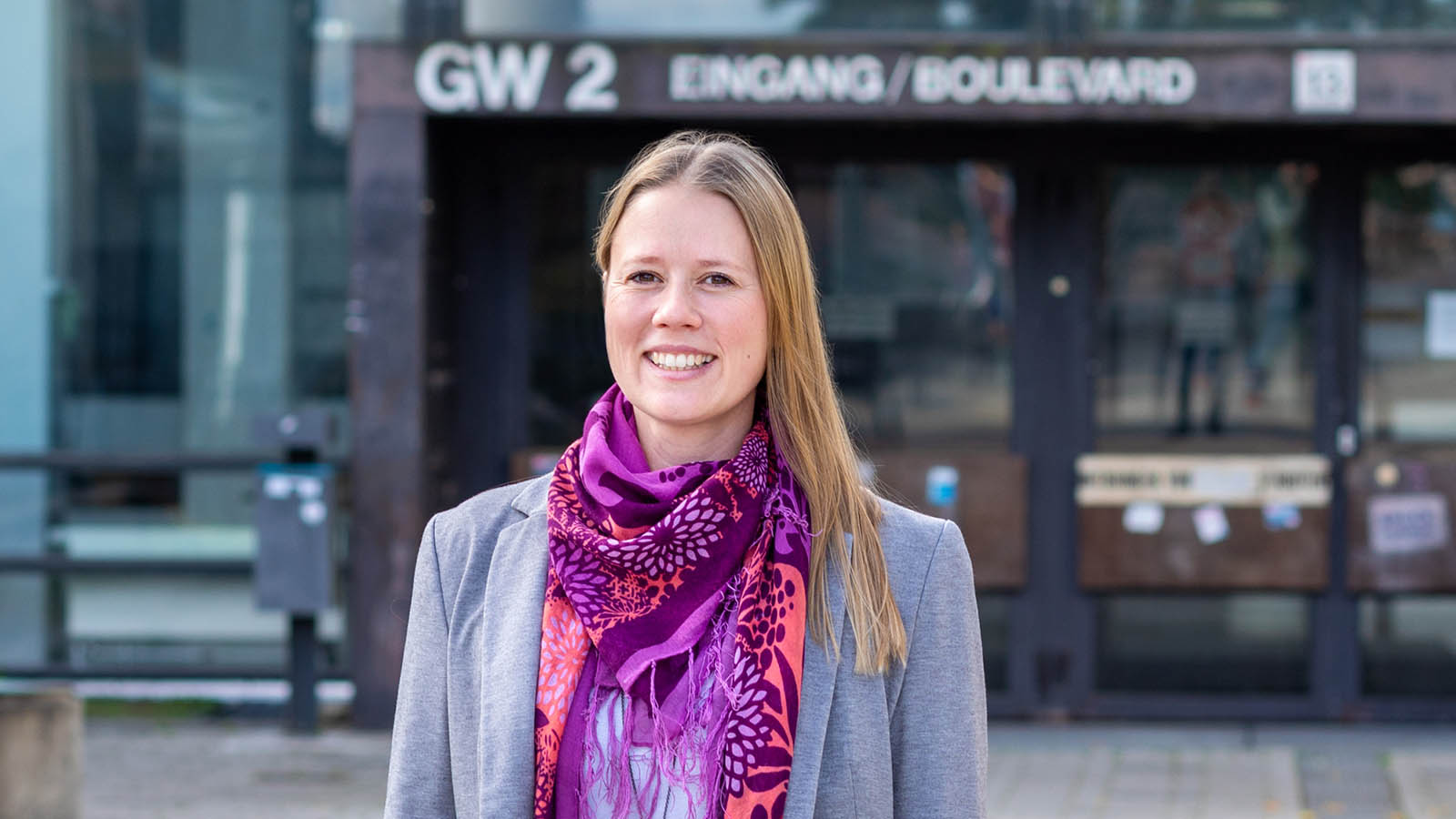
© Matej Meza / Universität Bremen
“A Good Work-Life Balance Is Possible at the Uni”
The academic mid-level sector in focus: Dr. Sarah L. Fornol from the Faculty of Pedagogy and Educational Sciences
She started her degree in Vechta in order to become a teacher but then became interested in research: Dr. Sarah L. Fornol specialized in primary school didactics for the subject German and works as a researcher in this field. Since 2017, she has been a lecturer in the Subject Didactics in the Primary and Elementary Phases department at the University of Bremen.
Become a teacher! That was the aim of the Osnabrück native Sarah L. Fornol when she began her degree in social, cultural, and natural sciences in Vechta in 2006. Her specialization subjects were German and social studies, especially biology. Vechta initially remained the center of her life, as she also completed a Master of Education degree for teaching education in primary and general schools there after her bachelor’s degree.
“Of course, you do ask yourself at some point what will happen next,” remembers Sarah L. Fornol. At the time, she realized that she was interested in research – “the term papers, the bachelor’s and master’s theses were all great fun.” She was particularly interested in language didactics, amongst other things the diagnosis and promotion of spoken and written language. She worked as a teaching staff member in this field in Vechta after completing her master’s degree.

© AdobeStock / Foto johoo
Second State Examination
The option to work as a primary school teacher had not entirely been written off at this point, “as teaching children is a great thing.” That is why she took an important intermediate step: “As advised by the woman who would later become my doctoral supervisor, I initially completed the second state examination for teacher education in primary and general schools in 2012. I am still profiting from the practical experience that I gained from my work at a primary school in Cloppenburg today.”
But then she took the final step into research. Sarah L. Fornol followed “her” professor, Anja Wildemann, who moved from Vechta to the University of Koblenz-Landau: “It is not unusual that scientific assistants accompany the professors of the working groups to which they belong.” At the Institute for Education in Childhood and Younger Years there, Sarah L Fornol worked in the department of primary school pedagogy four years and wrote her dissertation. Agents of Educational Language in School Pupils’ Texts (“Bildungssprachliche Mittel in Schülertexten”) was the title of her dissertation, for which she analyzed around 500 texts written by pupils.
“It is not unusual that scientific assistants accompany the professors of the working groups to which they belong.”
Expressing Oneself – Very Important for the Education of Children
What is the specialization that has formed the core of her research since then all about? “Language is extremely important for the education of children – and especially expressing oneself correctly. Thus, one shouldn’t say: ‘the thing’, but rather name the object correctly,” she explains. Additionally, using correct terms and a more complex sentence structure, describing situations in the passive voice sometimes play a role – “if you can do that, you will be successful at school,” according to her hypothesis. But what had remained unstudied until then was the question of on which levels the school pupils are, what do they truly know?
She analyzed linguistic characteristics in 500 texts for her research work and took a look at different groups, for example school pupils with and without a migration background. “My results are obviously broad, but one can generally say that primary school children have a great deal of knowledge.”
But she noticed special aspects: “For example, one realization was that educational language is often used in writing but is functionally not implemented correctly. As an example, one boy wrote: ‘Then the digestion entered into the stomach.’ That is not correct – and teaching staff must be very careful to correct such mistakes.” Teaching language not only with specialist terms but also making sure of its correct use is not just a task for German teachers but also for sport, art, and math teachers, for example.

© AdobeStock / Foto johoo
Back to the North for Career and Family
Even if Sarah L. Fornol liked it in Landau and was successful there, North Germany called her back in 2017. Her husband worked as a teacher in Hamburg and then in Nordhorn. Sarah L. Fornol’s hometown of Osnabrück seemed to be the right place in order to stop the relationship being long-distance. “My husband is now a headteacher in Bad Essen – that suits us,” she smirks. “And as a researcher, I have a contact person from the practical field,” she notes happily. The couple now also has two children.
Returning to the North was made even easier by the fact that the language didactics scholar had met Professor Sven Nickel from the University of Bremen in 2017 at a conference on writing texts in primary schools, which was held at the University of Koblenz-Landau. Until recently, he was head of the German didactics unit in the Subject Didactics in the Primary and Elementary Phases department, Faculty of Pedagogy and Educational Sciences. Sarah L. Fornol took on a part-time position as a lecturer in his working group. The specializations in educational language, language-sensitive (specialist) lessons, language promotion, and multilingualism in the group fitted ideally with what she had previously done.
“The job of a lecturer is primarily teaching. We train the teachers of tomorrow,” she states. In German, she makes sure that the future teaching staff are prepared for language-sensitive lessons. “I can also involve my research interests here in Bremen. For example, I work closely with the PhD team in our department and often talk to my colleagues.”
“Evening Shift” Cannot Always Be Avoided
As a commuter and mother of two children, Sarah L. Fornol has found a part-time (50%) job at the University of Bremen with which she can have a good “work-life balance.” “Sven Nickel has supported my colleagues and myself. It is a shame that he has now gone to the Free University of Bozen-Bolzano,” she says. “We have quite a few children. But family and career can be combined well with each other here – in part because we pay attention to it.” It cannot be avoided that you often have to do an “evening shift” from 8 p.m. to 11 p.m. as a scientist with children.
“Family and career can be combined well with each other here – in part because we pay attention to it.”
She is generally in the office in Bremen two days a week. However, that has not been the case since corona has been influencing university operations: “I can teach digitally using Zoom video conferences and screencasts. That will also be the case in the winter semester – I decided this early on so that everyone knows what they’re dealing with and for what they have to be prepared.” At the beginning, it was rather unusual to hold a lecture, such as the compulsory module Basics of Language Didactics for 180 students in front of a screen, “but it has become routine.”
Since 2018, Sarah L. Fornol has also been the co-publisher of a scientific magazine. Grundschule Deutsch, a publication that presents the newest didactic findings from research and the practical field to a wide public is published by the Friedrich Publishing House. Teaching and research “made in Bremen” – that also works very well in the field of primary school didactics.